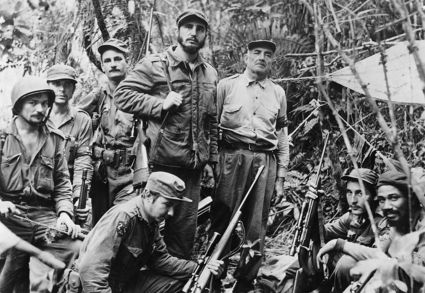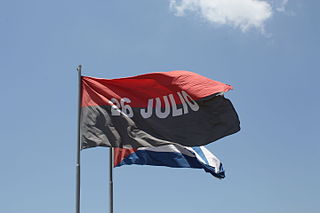The offensive against the Moncada barracks on the 26th of July 1953 marked the beginning of the Cuban Revolution. The 70th anniversary is a good opportunity to reflect on both the long history and the contemporary updating of Cuba’s system which combines planning and market. Cuba is once again in the spotlight as it continues
The offensive against the Moncada barracks on the 26th of July 1953 marked the beginning of the Cuban Revolution. The 70th anniversary is a good opportunity to reflect on both the long history and the contemporary updating of Cuba’s system which combines planning and market.
Cuba is once again in the spotlight as it continues its transformation after the Covid-19 pandemic, and seeks to develop its new version of socialism. For domestic and international audiences, the 70th anniversary of the start of the revolution is certainly a good opportunity to recall the various historical steps that led to the rejection of the old regime and the establishment of a new social system.
The attack on the Moncada Barrack in 1953 was a complicated start to revolutionary activities. Although rebels were arrested, the attack publicly sparked a resistance movement, motivated critics of dictator Fulgencio Batista to further activities, and eventually to his overthrow. Fidel Castro, along with approximately 100 rebels, attacked the Moncada barracks in Santiago de Cuba. Although they first considered an attack on the barracks in Pinar del Rio in the western part of Cuba, finally they decided to attack the barracks in Santiago in the eastern part of the island. There were several reasons. The barracks in Santiago were less guarded due to their greater distance from the capital and also strategically close to the Sierra Maestra mountain range. The fact that Santiago was the symbolic site of José Martí and Antonio Maceo’s previous struggles for independence also played a role.
The clash and requirements
The revolutionaries wanted to seize the barracks, arm themselves and support a popular uprising against the Batista regime, which was corrupt and benefited only a small group of the wealthiest. It all started on the morning of the 26th of July 1953. However, after the first use of the element of surprise, the balance of forces was reversed and the surprised barracks military forces put up a formidable defence. When the insurgents were overwhelmed by pressure from many soldiers, the insurgents were forced to retreat.
Although the attack on the Moncada barracks did not end as the fighters expected, it also had positive consequences for the Cuban revolution in the longer term. While many of the fighters were captured and some were executed, Fidel Castro was arrested, tried, and sentenced to 15 years in prison. Castro’s defence speech, “History Will Absolve Me” (La historia me absolverá), delivered during his trial on the 16th of October 1953, outlined his criticism of the regime and gained him considerable attention and support.
The speech contained five revolutionary laws that its author wanted to enforce. The first sought to restore state sovereignty by returning to the 1940 Cuban constitution. The second called for agrarian reform to benefit farmers. The third law concerned industrial workers, to whom he wanted to guarantee a 30% share of corporate profits. The fourth similarly demanded 55% of profits for sugar workers. And the fifth law sought to confiscate the property of those who had been corrupted under the previous regime.
M-26-7 and the guerrillos

Fidel Castro and his men, Sierra Maestra 2 December 1956. Source: Unknown Author, Public Domain
The subsequent release in 1955 under a political amnesty allowed Castro to revive the revolutionary movement and continue the struggle against the Batista dictatorship. The date of the attack on the Moncada, 26 July, was reflected in the name “Movimiento 26 de julio” (Movement of 26 July, abbreviated M-26-7), the name of the revolutionary organisation that played a crucial role in the final overthrow of the Batista regime. First, however, Fidel Castro had to go into exile in Mexico where he and his brother Raúl, Che Guevara and other guerrilleros prepared for new attacks on Batista’s dictatorship. In the meantime, armed confrontations took place in Cuba, opening up further space for the subsequent success of the revolutionary voyage to Cuba on the Granma boat. The final step of the revolution took place on the 1st of January 1959.
In retrospect, the attack on the Moncada barracks in 1953 was the first pivotal moment that brought the revolutionary struggle against the Batista regime. The Cuban revolt was ultimately successful and gradually established a socialist system. The main emphasis since then has been on the development of the social issues, especially health and education. The date of 26July has since been celebrated in Cuba as the Day of National Revolt (Día de la Rebeldía Nacional), which marks the beginning of the Cuban Revolution. It is commemorated by various events in many places throughout Cuba and abroad.
Where is Cuba heading now?
After the collapse of the Soviet-led Eastern bloc in the early 1990s, Cuba lost its strategic allies and had to face an economic downturn and re-consolidate later. Since around 2007, it has been undergoing a transformation that introduces a new concept of socialism and democracy. It combines state planning with the market while allowing for both public ownership and small and medium private ownership. It also promotes various forms of cooperatives in farming and other sectors. The reforms were legally completed with the adoption of a new constitution in 2019. Hopefully, they will soon be able to develop more fully in practice.

Plaza de la Revolución, Santiago de Cuba
Although the Covid-19 pandemic slowed the progress of the reforms, the transformation is already unfolding again. It is taking place both in domestic Cuban conditions and in cooperation with foreign partners: with Venezuela, China, and other countries in all parts of the world, especially in the context of the second left tide in Latin America. At the same time, however, Cuba has to face problems because of the long-standing US embargo, which is hampering Cuban cooperation with many countries and which is the subject of criticism from most countries in the world. Nevertheless, Cuba is capable of withstanding the situation.
This year’s 70th anniversary is an extraordinary opportunity not only to look back at the long history that has taken place since the beginning of the Cuban Revolution but also to look forward to future developments in Cuba.
Martin Lampter is a philosopher and political economist who has worked at universities mainly in the Southern and Central European countries and in South America. He cooperates also with SPED (transform! europe member organisation).